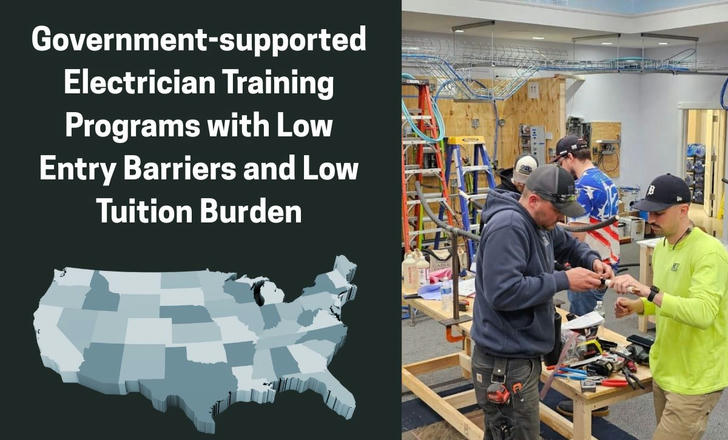Electrician Training Guide: Government-Supported Programs to Start Your High-paying Career
In the United States, electrician is becoming one of the most in-demand, high-paying technical professions. Government-supported electrician training programs offer a low entry barriers path for beginners and career changers to enter the industry without huge tuition burden.

What are the benefits of government-supported Training?
Beginner-Friendly Curriculum: Courses start from basic electrical theory and safety, with step-by-step modules that help learners build skills gradually.
Cost-Effective Support: Eligible participants can access government-supported funding, reducing tuition and course fees.
Certification Guidance: Training includes exam preparation and hands-on practice to help learners meet state certification requirements.
Flexible Scheduling: Evening or weekend courses make it easier for working adults to study without interrupting their daily life.
Practical Experience: Training combines classroom learning with real-world electrical projects, allowing students to apply theory in a controlled, supportive environment.
What government-supported Training is available?
| Program Name | What It Offers | Key Features |
|---|---|---|
| Workforce Innovation and Opportunity Act (WIOA) | Tuition support and career guidance for eligible students | Helps learners manage training costs; must meet eligibility requirements |
| GI Bill® Electrician Training | Funding for veterans to enroll in electrician programs | Supports tuition and some living expenses |
| State Registered Training Programs | Structured government-supported electrician courses | Includes classroom instruction and practical exercises, aligned with certification requirements |
| Trade Adjustment Assistance (TAA) | Supports workers impacted by layoffs to acquire new skills | Supports course fees and provides employment guidance |
How about future career development?
The demand for skilled electricians is expected to grow steadily over the next decade, driven by new construction, infrastructure upgrades, and emerging technologies. Key high-growth specialties include:
Green Energy Electricians (solar, wind) – Average $70,000+/year, with strong demand in renewable projects.
Smart Home Technicians – $65,000–$70,000/year, focusing on home automation and energy-efficient systems.
EV Charging Station Installers – Around $68,000/year, supporting the expansion of electric vehicle infrastructure.
Commercial & Industrial Electricians – $60,000–$75,000/year, with opportunities for advanced certifications and supervisory roles.
These roles are projected to grow faster than traditional residential positions, offering stable employment and opportunities to expand skills over time.
How to Get Started?
1.Check whether your state offers government-supported electrician training programs.
2.Contact your local labor department or training center to learn about eligibility and enrollment.
3.Prepare necessary documents, such as ID, education records, and basic health verification.
4.Enroll and actively participate in courses, combining classroom learning with practical exercises to build skills and prepare for certification.
Important Tips
• Government-supported training may have limited availability—apply early to secure a spot.
• Some programs may require completing certain service or participation commitments to maintain funding eligibility.
• Always confirm that the course meets state certification standards before enrolling.
Summary:
Electrician training is accessible even for beginners, supported by government programs that reduce financial pressure and provide structured learning paths. With the right preparation and guidance, it is possible to gain essential skills, earn certification, and step into a stable and rewarding career.
